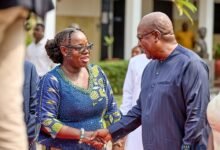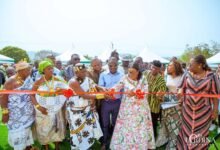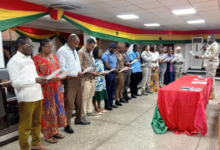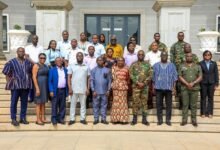600,000 seedlings planted to restore degraded transitional zone forest
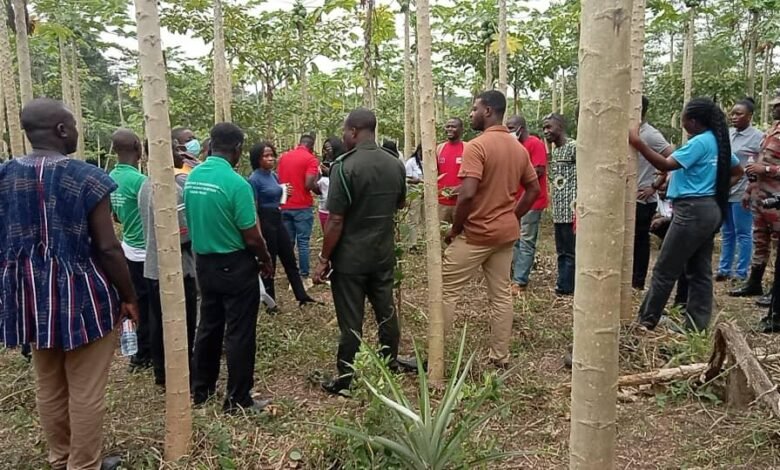
More than 600,000 tree seedlings have been planted across 60 communities in the transitional zones of the Bono East and Ashanti Regions in the last four years to restore degraded forest areas.
The afforestation drive is a $5 million initiative funded by the European Union, the Landscape and Environmental Agility Across the Nation (LEAN) project.
The LEAN project, launched in 2020, aims to bolster governmental efforts in conserving biodiversity, enhancing climate change resilience, and reducing carbon emissions from land use.
Set to end on October 31, 2024, it focuses on the Savanna, high forest, and transitional zones in Ghana by supporting local farmers in improving their livelihoods with more than 5,000 beneficiaries currently.
The project’s progress was highlighted during a three-day verification visit by four consortium partners, including ECOCare Ghana, Tropenbos Ghana, Rainforest Alliance and World Vision Ghana, last week.
The consortium was joined by key state agencies such as the Forestry Commission, Ghana National Fire Service, and the Ministry of Food and Agriculture (MoFA).
The tour spanned several communities in both the Ashanti and Bono East Regions, including Bonsua, Kyebi, and Darso in Offinso North as well as Asueyi, Mesidan, Konkompe, Drumankuma, and Busunya in the Nkoranza North and South districts.
The LEAN project prioritises integrated landscape management models across three critical landscapes, emphasising the need for functional and sustainable governance structures.
The initiative also encourages smallholder farmers to adopt more sustainable farming and forest management practices with added market incentives to diversify rural income opportunities.
Project Manager, Tropenbos Ghana, Mr Kwame Frimpong Sekyere, in an interview with the media stated that the visit was to draw lessons from other landscapes management boards as well as assess the impact of the project on the beneficiary farmers and communities.
According to him, the project was being implemented in three landscapes which included high forest being managed by Rainforest Alliance, Transitional landscape managed by Tropenbos Ghana and Savanna by World Vision Ghana.
As part of sustainability of the project, he said, Landscape Management Boards (LMBs) had been instituted to take over implementation as the project folds up in October 2024.
The LMBs, Mr Frimpong Sekyere noted, would be supported with funds from the alternative livelihoods established for the small holder farmers.
Some of the beneficiary farmers who interacted with the journalists appreciated the impact the project has had on them.
The Senior Project Manager at the Rainforest Alliance Abena Dufie Woode said the EU LEAN project understood farmers’ livelihoods and income-generating activities were tied to forest resources.
She said therefore, providing alternative livelihoods and income sources for farmers was essential to prevent them from tree felling for sale as firewood or timber.
“In the three landscapes that the EU- LEAN Project is being implemented, alternative livelihoods and income-generating activities have been provided for farmers.
“For example, several farmers have been trained and supported to start beekeeping, snail rearing, piggery, fish farming, smock weaving and vegetable and mushroom farming, among others, across the three landscapes”, said.
Ms Dufie added that as climate change impacts intensified, it was essential to tackle any restoration intervention with the livelihoods of farmers who rely solely on forest resources at the centre.
One of them , Mr Osei Kwadwo, who had planted 15-acre trees interspersed with pawpaw stressed that the financial support from LEAN had equipped him to hire farmhands to plant and nurture over 6,000 trees on his farm.
The project, he noted, would help mitigate the impact of climate change as well as restore the vegetation cover of the area.
At Techiman, the team interacted with officials of the Techiman Municipal Assembly on its by-laws on anti- bush burning, deforestation, protection of water bodies, kraaling practices and gazetting of the by-laws, among others.
The team also visited Agroforestry farm at Konkompe with the provision of shade tree seedlings and registration as an incentive to farm.
FROM DANIEL DZIRASAH, TECHIMAN


